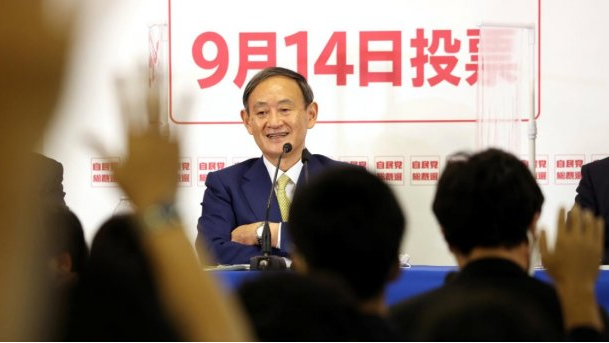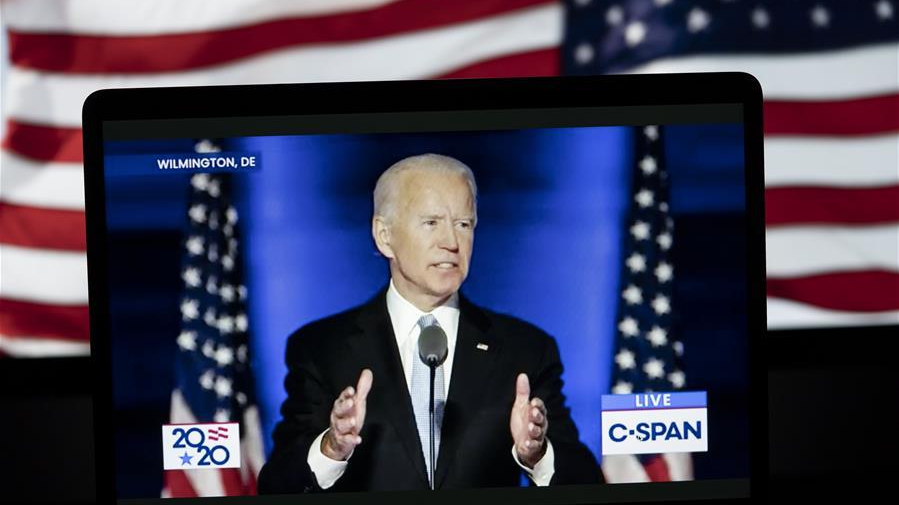
Editor's note: Xu Chuanbo is an assistant researcher at the Institute of Areas Studies, Peking University. The article reflects the author's opinions, and not necessarily the views of CGTN.
In December 1941, Japan did not hesitate to "gamble on national fortune" and launched a Pacific war with the United States, whose national strength far exceeded its own. When talking about the decision to go to war, Hideki Tojo, the then prime minister, said, "Occasionally, one must conjure up enough courage, close one's eyes, and jump off the platform of the Kiyomizu."
When Tojo said this, he was in a crazy mood, and seems to have been infected by his so-called "courage." Of course, in addition to madness, he also thought that Japan could rely on Germany's strong military power and support to remain invincible. However, history showed that he was wrong.
Today, 80 years later, Japan's leaders seem to be repeating the mistakes of those years. On April 15, Prime Minister Yoshihide Suga went to the United States "painstakingly" to "meet" U.S. President Joe Biden. On April 17, Japan and the United States issued a joint statement.
In addition to reiterating that the Diaoyu Islands belong to the scope of application of the Japan-U.S. security treaty, the statement's stance on Taiwan is particularly striking. The declaration said that Japan and the United States stressed the importance of peace and stability in the Taiwan Straits.
As we all know, the United States has repeatedly interfered in the Taiwan issue, but Japan is more cautious on this issue. Since 1969, Japan has never talked about the Taiwan issue in a joint statement with the United States. But since this year, Japan's "courage" seems to have doubled.
On March 16, Japan's Defense Minister Nobuo Kishi said in the talks between Japan and the United States defense chiefs that once Taiwan encounters "unexpected events," Japan will dispatch its Self-Defence Forces to assist the U.S. military. Kyodo News Agency pointed out that this statement by the Japanese government is rare. It is clear that Japan is trying to get involved in the Taiwan issue openly.
Analysts pointed out that the move of Suga's cabinet is related to the current situation. Due to the weak anti-epidemic response, weak economy and corruption scandals, Suga's cabinet support rate has been stuck at about 40 percent.
In order to face the Liberal Democratic Party (LDP) presidential election in September and the house election in October, and keep the prime minister's position, Suga is eager to use his diplomatic performance to improve the support rate of the cabinet. In this case, making trouble on the Taiwan issue is undoubtedly the best choice to pass on domestic contradictions.

The livestream of Joe Biden delivering a speech in Wilmington, Delaware, U.S., November 7, 2020. /Xinhua
The livestream of Joe Biden delivering a speech in Wilmington, Delaware, U.S., November 7, 2020. /Xinhua
At the same time, to get involved in the Taiwan issue can also strengthen the Japan-U.S. alliance and show Japan's "pledge of allegiance" to the United States. The success of the meeting with Biden may determine Suga's political fate.
However, Suga seems to have miscalculated. Taiwan concerns China's national sovereignty and territorial integrity and is China's core interest. China will not hesitate to use force for this purpose. Suga's "playing with fire" on this issue will certainly increase the probability of conflicts between China and Japan.
There is another point that Japan should ponder. Will the United States always support Japan? As we all know, the United States has always been playing with double-faced behavior with Japan. Not long ago, Japan announced that it would discharge Fukushima nuclear polluted water into the Pacific Ocean.
The United States immediately expressed its support, but then the U.S. Food and Drug Administration banned Japanese food, vegetables, fish, milk powder and other products from entering the United States on the grounds of nuclear contamination. This is a surprise. In fact, many observers doubt whether the United States will faithfully safeguard Japan's interests.
Joshua Walker, president of the Japan Society, a Japan-U.S. exchange group, described Japan-U.S. relations as "cherry blossoms." He said that Japan-U.S. relations seem to be as beautiful as cherry blossoms, but once they encounter wind and rain, the United States will immediately change its direction.
In fact, Suga seems to know something about it. At the press conference after the talks, a Sankei Shimbun reporter kept on asking: What can Japan do to prevent emergencies in the Taiwan Straits, or when emergencies occur in the Taiwan Straits? Suga replied that Japan and the United States have reached a consensus on the Taiwan Straits issue, so they will not talk about details. It can be seen that Suga does not have the full confidence to confront China.
On the whole, Japan today seems to be quite similar to itself 80 years ago before the Pacific War. In two different historical periods, Japan pinned its hopes on relying on a certain powerful country, tied its destiny to the chariot of a powerful country, and foolishly and rudely violated the interests of a peaceful country. The result will be the same as the failure. Has Japan made up its mind to jump off the stage of Kiyomizu temple for the second time?
(If you want to contribute and have specific expertise, please contact us at opinions@cgtn.com.)

